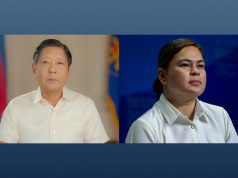
The reply of humor blogger and critic “The Professional Heckler” proved presidential spokesperson Salvador Panelo wrong as he questioned whether the latter had understood his post about President Rodrigo Duterte or not.
The Twitter account, which is run by Marcelo Landicho, said that Panelo should “just stop” making accusations about him as he jokingly invoked Pastor Pastor Apollo Quiboloy’s name.
“I JUST READ Panelo’s statement. He accused me of spreading fake news. WHUTTT?!? Did he understand my tweet? Did he even watch the video? And I was associated daw with an official of the Aquino admin?!??” ‘Professional Heckler’ said.
“I. CAN’T. EVEN. Stop. Just stop. Please, Quiboloy, make them STOP,” he added with an amused emoji.
The Twitter account is known for uploading satirical posts and views about the government, although it claimed that it has also been critical of the previous administrations of Fidel Ramos, Joseph Estrada, Gloria Macapagal-Arroyo and Noynoy Aquino.
I JUST READ Panelo's statement. He accused me of spreading fake news. WHUTTT?!? Did he understand my tweet? Did he even watch the video? And I was associated daw with an official of the Aquino admin?!??
I. CAN'T. EVEN.
Stop. Just stop. Please, Quiboloy, make them STOP.😆
— The Professional Heckler (@hecklerforever8) November 3, 2019
The post was a response to Panelo’s remarks accusing the account of participating in a “vicious campaign of hate” against Duterte when it uploaded an edited video of him yesterday.
The video featured Gianni Infantino, the Fédération Internationale de Football Association (FIFA) president, handing out customized jerseys to leaders of the Association of Southeast Asian Nations (ASEAN).
It was edited to make it appear as if Duterte had not received a jersey, which “Professional Heckler” had captioned with emojis:
“Noong bata ka, naramdaman mo rin ito. Lahat nabigyan na ng candy, maliban sa ‘yo. Naiiyak ka na pero nagpigil ka lang para ‘di mapahiya.”
He added that the video he shared was “shortened.”
Noong bata ka, naramdaman mo rin ito. Lahat nabigyan na ng candy, maliban sa ‘yo. Naiiyak ka na pero nagpigil ka lang para 'di mapahiya. 😆☺️😁
(VOA uploaded a clearer video on YouTube but dyaraaaan…. it has been shortened. 🤣) pic.twitter.com/Gp7BCcW5jS
— The Professional Heckler (@hecklerforever8) November 3, 2019
However, this did not go well with Panelo, who described it as “sinister fake news” and a “dirty political stunt.”
RELATED: Palace says video showing that Duterte did not receive FIFA jersey is ‘false’
“The official photo of the President, easily accessible in the Facebook account of the Presidential Communications, immediately puts a lie to this sinister false news,” Panelo said.
“The latest dirty political stunt underscores the obsession of PRRD’s foes to embarrass him and put him to ridicule at every opportunity presented to them,” he added.
Duterte might have received a jersey but it took Infantino a while to give it to him.
“Videos showed, however, that Infantino took time to get Duterte’s jersey. Some leaders got their jersey ahead of Duterte, and he turned out to be the last recipient. This then explained why spliced videos showed that Duterte appeared to have not received the FIFA jersey,” Philstar said.
Officials on satire
This is not the first time that a satirical account has irked the Palace.
Last May, Panelo slammed parody page “Malacañang Events and Catering Services” for posting an edited picture of him supposedly endorsing senatorial aspirants from the opposition for the midterm polls.
It was supposed to be a satire but he said that it “amounts to defamatory imputation.”
Another government official also slammed a satire page last October when it posted a content that was taken literally.
Celine Pialago, the spokesperson of the Metro Manila Development Authority, threatened to sue “Barurot News” after it posted a picture of her with the caption: “MMDA sa Commuters: Kung Nahihirapan Sumakay, ’Wag Na Lang Pumasok.”
RELATED: For some Filipinos (like the MMDA spokesperson), satire is being passed as ‘news’
Satire is a protected speech based on a 2015 ruling of the Supreme Court.
A professor of communication at the University of Delaware shared that it has been used as an effective way to expose “hypocrisy and flaws” to the public.
“Satirists like Aristophanes writing in ancient Greece used rich political satire and irony to expose hypocrisy and flaws among elites and within policies and institutions,” Dannagal Young said.
“In reality, humor has always had a very natural place in politics, particularly in democratic regimes where elected officials are accountable for their actions and citizens look at them with a critical eye,” Young added.









